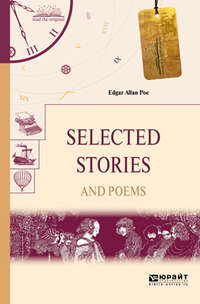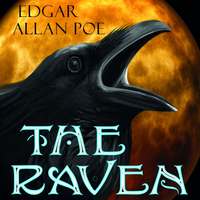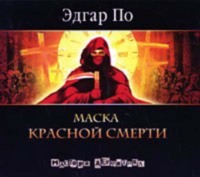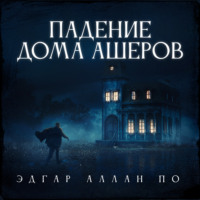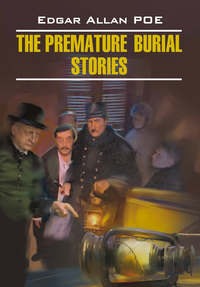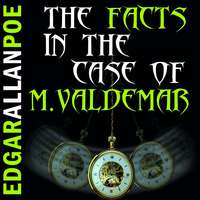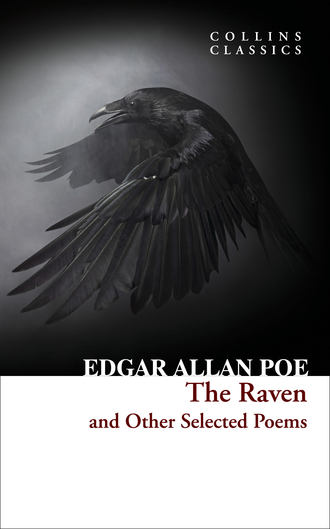
Полная версия
The Raven and Other Selected Poems

THE RAVEN AND OTHER SELECTED POEMS
Edgar Allan Poe

Copyright
William Collins
An imprint of HarperCollinsPublishers
1 London Bridge Street
London SE1 9GF
www.WilliamCollinsBooks.com
This eBook published in Great Britain by William Collins in 2016
Life & Times section © HarperCollinsPublishers Ltd
Gerard Cheshire asserts his moral rights as author of the Life & Times section
Classic Literature: Words and Phrases adapted from Collins English Dictionary
Cover by e-Digital Design.
Cover image © Conceptor/iStock
A catalogue record for this book is available from the British Library
All rights reserved under International and Pan-American Copyright Conventions. By payment of the required fees, you have been granted the non-exclusive, non-transferable right to access and read the text of this e-book on-screen. No part of this text may be reproduced, transmitted, down-loaded, decompiled, reverse engineered, or stored in or introduced into any information storage and retrieval system, in any form or by any means, whether electronic or mechanical, now known or hereinafter invented, without the express written permission of HarperCollins
Source ISBN: 9780008180515
Ebook Edition © September 2016 ISBN: 9780008180522
Version: 2016-09-23
CONTENTS
Cover
Title Page
Copyright
History of William Collins
Life & Times
The Raven
The Raven
Selected Poems 1827–1849
A Dream
A Dream within a Dream
Dreams
Evening Star
“In Youth I Have Known One” (Stanzas)
Song
Spirits of the Dead
Tamerlane
“The Happiest Day, the Happiest Hour”
The Lake
Al Aaraaf
Alone
Elizabeth
Fairy-Land
Romance
Sonnet—To Science
To– – (“I heed not that my earthly lot”)
To– – (“The bowers whereat, in dreams, I see”)
To the River
A Pæan
Israfel
Lenore
The City in the Sea
The Sleeper
The Valley of Unrest
To Helen (“Helen, thy beauty is to me”)
Serenade
The Coliseum
To One in Paradise
Hymn
To F— — (“Beloved! amid the earnest woes”)
To Frances S. Osgood
Bridal Ballad
Sonnet—To Zante
The Haunted Palace
Sonnet—Silence
The Conqueror Worm
Dream-Land
Epigram for Wall Street
Eulalie—A Song
A Valentine
To Marie Louise Shew (“Of all who hail thy presence as the morning”)
Ulalume—A Ballad
An Enigma
To Marie Louise Shew (“Not long ago, the writer of these lines”)
To Helen (“I saw thee once—once only— years ago”)
Annabel Lee
Eldorado
For Annie
The Bells
To My Mother
Classic Literature: Words and Phrases
About the Publisher
History of William Collins
In 1819, millworker William Collins from Glasgow, Scotland, set up a company for printing and publishing pamphlets, sermons, hymn books and prayer books. That company was Collins and was to mark the birth of HarperCollins Publishers as we know it today. The long tradition of Collins dictionary publishing can be traced back to the first dictionary William published in 1824, Greek and English Lexicon. Indeed, from 1840 onwards, he began to produce illustrated dictionaries and even obtained a licence to print and publish the Bible.
Soon after, William published the first Collins novel, Ready Reckoner; however, it was the time of the Long Depression, where harvests were poor, prices were high, potato crops had failed and violence was erupting in Europe. As a result, many factories across the country were forced to close down and William chose to retire in 1846, partly due to the hardships he was facing.
Aged 30, William’s son, William II, took over the business. A keen humanitarian with a warm heart and a generous spirit, William II was truly “Victorian” in his outlook. He introduced new, up-to-date steam presses and published affordable editions of Shakespeare’s works and The Pilgrim’s Progress, making them available to the masses for the first time. A new demand for educational books meant that success came with the publication of travel books, scientific books, encyclopedias and dictionaries. This demand to be educated led to the later publication of atlases, and Collins also held the monopoly on scripture writing at the time.
In the 1860s Collins began to expand and diversify and the idea of “books for the millions” was developed. Affordable editions of classical literature were published, and in 1903 Collins introduced 10 titles in their Collins Handy Illustrated Pocket Novels. These proved so popular that a few years later this had increased to an output of 50 volumes, selling nearly half a million in their year of publication. In the same year, The Everyman’s Library was also instituted, with the idea of publishing an affordable library of the most important classical works, biographies, religious and philosophical treatments, plays, poems, travel and adventure. This series eclipsed all competition at the time, and the introduction of paperback books in the 1950s helped to open that market and marked a high point in the industry.
HarperCollins is and has always been a champion of the classics, and the current Collins Classics series follows in this tradition – publishing classical literature that is affordable and available to all. Beautifully packaged, highly collectible and intended to be reread and enjoyed at every opportunity.
Life & Times
About the Author
Edgar Allan Poe was an American writer of fantastical, bizarre and sometimes disturbing short stories. He lived and worked in the first half of the nineteenth century and died a mysterious death, many believe caused by an overdose of drugs, at the age of 40. It seems likely that Poe was himself inclined towards obsessive and unbalanced behaviour. As a child his father abandoned the family and his mother died shortly thereafter, leaving him an orphan. He was taken in by the Allan family; however, they endured a strained relationship and he became estranged from them when he failed to complete university and then to become an army officer. For the years that followed, he wrote poetry and then prose and became a literary critic, contributing to and working for many periodicals and journals of the time. In 1835, Poe married his 13-year-old cousin in secret, and ten years later wrote perhaps his most well-known poem, “The Raven”.
Poe’s work is usually described as “Gothic” in style, as he alludes to the macabre, grotesque and horrifying. Poe used the phrase “terrors of the soul” in explaining the primary focus of investigation in his prose and poetry. He was clearly preoccupied with delving into the darker reaches of the human psyche to see what he could find.
In the 1960s he became an influence on British pop music due to his highly imaginative literary imagery. The Beatles included a portrait of Poe on the cover of their 1967 album Sgt. Pepper’s Lonely Hearts Club Band and John Lennon mentions Poe in the song ‘I am the Walrus’, released later that same year. The Beatles were heavily influenced by experimentation with hallucinogenic drugs such as LSD (lysergic acid diethylamide) and many felt that reading Poe’s work was akin to the kind of psychological experiences elicited by hallucinogens. It may have been that Poe used them himself to enter his unique literary realm.
Prose Works
Tales of Mystery and Imagination was first compiled and published in 1908, some 59 years after Poe’s untimely death. There had been other canons of his writing, but this one focused specifically on the darker side of his work, omitting poetry and comic prose. Perhaps the most regarded of the short stories therein is The Murders in the Rue Morgue, originally published in 1841. In this story Poe invents the first literary detective, named Auguste Dupin, who sets about solving the mysterious double murder of a Parisian lady and her daughter in a street named Rue Morgue (Mortuary Street). A man has been wrongly accused and Dupin, having found an auburn-coloured hair, deduces a most unlikely culprit. Further investigation shows Dupin to be correct. The story is the first example of a fictional crime solved by the principle of deduction based on ingenuity, evidence and reason. It set the benchmark for later literary detectives, such as Sherlock Holmes and Hercule Poirot.
In The Fall of the House of Usher, originally published in 1839, Poe delves into matters of psychological illness, with the central character, Roderick Usher, suffering from all manner of mental disturbances. In Poe’s day, psychiatry had not yet defined specific conditions, but Roderick Usher had overly sensitive physical senses, an obsession with getting ill and was filled with extreme angst and anxiety about life. These days these symptoms would be classified respectively as hyperaesthesia, hypochondria and hysteria. Roderick Usher lives in a large house, where his sister has recently died and awaits being interred in the family tomb. The narrator of the story has come to stay with Roderick and witnesses various spooky events, whilst Roderick himself grows increasingly disturbed. The narrator reads Roderick a story to distract him, but this only serves to make things worse as the events in the story seem to embody themselves elsewhere in the house, and the narrator flees in fright.
Poetry
Though he was better known throughout his life as a literary critic than a poet, Poe wrote a number of poems in addition to his prose fiction. Like much of his prose, Poe’s poems tend to have a surreal, bizarre quality to them, as if they were the product of feverish dreams, and often tap into a darker way of looking at life. For instance the 1827 poem, “A Dream within a Dream” tackles the contrast between fantasy and reality, and “The City in the Sea” (1831) tells the story of a modern city ruled over by Death incarnate. The best known of Poe’s poetical works and his first critical success is the famous narrative poem “The Raven” (1845), which can be interpreted as an exploration of mental illness and madness. It depicts a prophetic raven visiting a man stricken by grief at the loss of his lover years before.
It has been suggested that Poe’s poetry has autobiographical elements: his life was troubled with spells of alcoholism and depression and marked by periods of intense activity and contrasting lows. In 1847, Poe’s wife Clemm died of tuberculosis. They had been together for twelve years and after her death Poe went into a decline. He became depressed and apathetic, turned to alcohol, and only a few years later came to the end of his own life. A man named Joseph Walker found Poe walking the streets of Baltimore in an incoherent and distressed condition. He was taken to hospital but his condition worsened and he died four days later. He had never been lucid enough to explain what had happened to him just prior to his death.
THE RAVEN
Once upon a midnight dreary, while I pondered, weak and weary,
Over many a quaint and curious volume of forgotten lore—
While I nodded, nearly napping, suddenly there came a tapping,
As of some one gently rapping—rapping at my chamber door.
“’Tis some visitor,” I muttered, “tapping at my chamber door—
Only this and nothing more.”
Ah, distinctly I remember, it was in the bleak December,
And each separate dying ember wrought its ghost upon the floor.
Eagerly I wished the morrow;—vainly I had sought to borrow
From my books surcease of sorrow—sorrow for the lost Lenore—
For the rare and radiant maiden whom the angels name Lenore—
Nameless here for evermore.
And the silken sad uncertain rustling of each purple curtain
Thrilled me—filled me with fantastic terrors never felt before;
So that now, to still the beating of my heart, I stood repeating
“’Tis some visitor entreating entrance at my chamber door—
Some late visitor entreating entrance at my chamber door;—
This it is and nothing more.”
Presently my soul grew stronger; hesitating then no longer,
“Sir,” said I, “or Madam, truly your forgiveness I implore;
But the fact is I was napping, and so gently you came rapping,
And so faintly you came tapping—tapping at my chamber door,
That I scarce was sure I heard you”—here I opened wide the door:—
Darkness there and nothing more.
Deep into that darkness peering, long I stood there wondering, fearing,
Doubting, dreaming dreams no mortal ever dared to dream before;
But the silence was unbroken, and the darkness gave no token,
And the only word there spoken was the whispered word, “Lenore!”
This I whispered, and an echo murmured back the word, “Lenore!”
Merely this and nothing more.
Back into the chamber turning, all my soul within me burning,
Soon I heard again a tapping, somewhat louder than before.
“Surely,” said I, “surely that is something at my window lattice;
Let me see, then, what thereat is, and this mystery explore—
Let my heart be still a moment, and this mystery explore;—
’Tis the wind and nothing more.”
Open here I flung the shutter, when, with many a flirt and flutter,
In there stepped a stately Raven of the saintly days of yore;
Not the least obeisance made he: not an instant stopped or stayed he;
But, with mien of lord or lady, perched above my chamber door–
Perched upon a bust of Pallas just above my chamber door—
Perched, and sat, and nothing more.
Then this ebony bird beguiling my sad fancy into smiling,
By the grave and stern decorum of the countenance it wore,
“Though thy crest be shorn and shaven, thou,” I said, “art sure no craven,
Ghastly grim and ancient Raven wandering from the Nightly shore—
Tell me what thy lordly name is on the Night’s Plutonian shore!”
Quoth the Raven, “Nevermore.”
Much I marvelled this ungainly fowl to hear discourse so plainly,
Though its answer little meaning—little relevancy bore;
For we cannot help agreeing that no living human being
Ever yet was blessed with seeing bird above his chamber door—
Bird or beast upon the sculptured bust above his chamber door,
With such name as “Nevermore.”
But the Raven, sitting lonely on that placid bust, spoke only
That one word, as if his soul in that one word he did outpour.
Nothing further then he uttered—not a feather then he fluttered—
Till I scarcely more than muttered, “Other friends have flown before—
On the morrow he will leave me, as my hopes have flown before.”
Then the bird said, “Nevermore.”
Startled at the stillness broken by reply so aptly spoken,
“Doubtless,” said I, “what it utters is its only stock and store,
Caught from some unhappy master whom unmerciful Disaster
Followed fast and followed faster till his songs one burden bore—
Till the dirges of his Hope the melancholy burden bore
Of ‘Never—nevermore.’”
But the Raven still beguiling all my sad soul into smiling,
Straight I wheeled a cushioned seat in front of bird and bust and door;
Then, upon the velvet sinking, I betook myself to linking
Fancy unto fancy, thinking what this ominous bird of yore—
What this grim, ungainly, ghastly, gaunt, and ominous bird of yore
Meant in croaking “Nevermore.”
This I sat engaged in guessing, but no syllable expressing
To the fowl whose fiery eyes now burned into my bosom’s core;
This and more I sat divining, with my head at ease reclining
On the cushion’s velvet lining that the lamp-light gloated o’er,
But whose velvet violet lining with the lamp-light gloating o’er,
She shall press, ah, nevermore!
Then, methought, the air grew denser, perfumed from an unseen censer
Swung by Seraphim whose foot-falls tinkled on the tufted floor.
“Wretch,” I cried, “thy God hath lent thee—by these angels he hath sent thee
Respite—respite and nepenthé from thy memories of Lenore!
Quaff, oh quaff this kind nepenthé, and forget this lost Lenore!”
Quoth the Raven, “Nevermore.”
“Prophet!” said I, “thing of evil!—prophet still, if bird or devil!—
Whether Tempter sent, or whether tempest tossed thee here ashore,
Desolate yet all undaunted, on this desert land enchanted—
On this home by Horror haunted—tell me truly, I implore—
Is there—is there balm in Gilead?—tell me—tell me, I implore!”
Quoth the Raven, “Nevermore.”
“Prophet!” said I, “thing of evil!—prophet still, if bird or devil!
By that Heaven that bends above us — by that God we both adore—
Tell this soul with sorrow laden if, within the distant Aidenn,
It shall clasp a sainted maiden whom the angels name Lenore—
Clasp a rare and radiant maiden whom the angels name Lenore.”
Quoth the Raven, “Nevermore.”
“Be that word our sign of parting, bird or fiend!” I shrieked, upstarting—
“Get thee back into the tempest and the Night’s Plutonian shore!
Leave no black plume as a token of that lie thy soul hath spoken!
Leave my loneliness unbroken!—quit the bust above my door!
Take thy beak from out my heart, and take thy form from off my door!”
Quoth the Raven, “Nevermore.”
And the Raven, never flitting, still is sitting, still is sitting
On the pallid bust of Pallas just above my chamber door;
And his eyes have all the seeming of a demon’s that is dreaming,
And the lamp-light o’er him streaming throws his shadow on the floor;
And my soul from out that shadow that lies floating on the floor
Shall be lifted—nevermore!
1845
A DREAM
In visions of the dark night
I have dreamed of joy departed—
But a waking dream of life and light
Hath left me broken-hearted.
Ah! what is not a dream by day
To him whose eyes are cast
On things around him with a ray
Turned back upon the past?
That holy dream—that holy dream,
While all the world were chiding,
Hath cheered me as a lovely beam,
A lonely spirit guiding.
What though that light, thro’ storm and night,
So trembled from afar—
What could there be more purely bright
In Truth’s day star?
1827
A DREAM WITHIN A DREAM
Take this kiss upon the brow!
And, in parting from you now,
Thus much let me avow—
You are not wrong, who deem
That my days have been a dream:
Yet if hope has flown away
In a night, or in a day,
In a vision or in none,
Is it therefore the less gone?
All that we see or seem
Is but a dream within a dream.
I stand amid the roar
Of a surf-tormented shore,
And I hold within my hand
Grains of the golden sand—
How few! yet how they creep
Through my fingers to the deep
While I weep—while I weep!
O God! can I not grasp
Them with a tighter clasp?
O God! can I not save
One from the pitiless wave?
Is all that we see or seem
But a dream within a dream?
1827
DREAMS
Oh! that my young life were a lasting dream!
My spirit not awakening, till the beam
Of an Eternity should bring the morrow.
Yes! though that long dream were of hopeless sorrow,
’Twere better than the cold reality
Of waking life, to him whose heart must be,
And hath been still, upon the lovely earth,
A chaos of deep passion, from his birth.
But should it be—that dream eternally
Continuing—as dreams have been to me
In my young boyhood—should it thus be given,
’Twere folly still to hope for higher Heaven.
For I have revelled when the sun was bright
I’ the summer sky, in dreams of living light
And loveliness,—have left my very heart
Inclines of my imaginary apart
From mine own home, with beings that have been
Of mine own thought—what more could I have seen?
’Twas once—and only once—and the wild hour
From my remembrance shall not pass—some power
Or spell had bound me—’twas the chilly wind
Came o’er me in the night, and left behind
Its image on my spirit—or the moon
Shone on my slumbers in her lofty noon
Too coldly—or the stars—howe’er it was
That dream was that that night-wind—let it pass.
I have been happy, though in a dream.
I have been happy—and I love the theme:
Dreams! in their vivid coloring of life
As in that fleeting, shadowy, misty strife
Of semblance with reality which brings
To the delirious eye, more lovely things
Of Paradise and Love—and all my own!—
Than young Hope in his sunniest hour hath known.
1827
EVENING STAR
’Twas noontide of summer,
And midtime of night,
And stars, in their orbits,
Shone pale, through the light
Of the brighter, cold moon.
’Mid planets her slaves,
Herself in the Heavens,
Her beam on the waves.
I gazed awhile
On her cold smile;
Too cold—too cold for me—
There passed, as a shroud,
A fleecy cloud,
And I turned away to thee,
Proud Evening Star,
In thy glory afar
And dearer thy beam shall be;
For joy to my heart
Is the proud part
Thou bearest in Heaven at night,
And more I admire
Thy distant fire,
Than that colder, lowly light.
1827
“IN YOUTH I HAVE KNOWN ONE”



